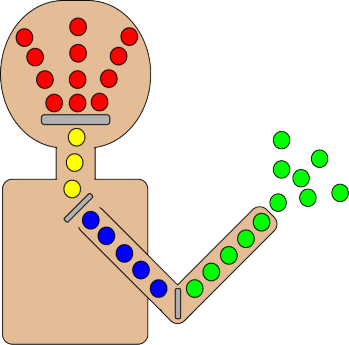Draft dodging: the first and final version
The concept of a 'draft version' has always seemed rather alien to me. Many of you may think of this as odd. I'm aware that many people have no confidence in things that they have written - things such as essays, short stories, and reports - until they have reviewed and edited their work, and have produced a 'final version' in which spelling, grammar, and semantic mistakes are fixed up. I've always considered this practice of progressing from one distinct version of a document to another - that is, from draft to final - to be unnecessary and a waste of time.
Now, before you accuse me of boasting and of being arrogant, let me just make it clear that my writing does not magically materialise in my head in the sleek, refined form that is its finished state, as I will now explain. What happens is that without ever even realising it, I always correct and analyse my writing as I go, making sure that my first version is as near to final as can be. Essentially, as each word or sentence sprouts forth from my mind, it passes through a rigorous process of editing and correction, so that by the time it reaches the page, it has already evolved from raw idea, to crudely communicated language, to polished and sophisticated language.
The diagram below illustrates this process:

The circular dots travelling through the body represent snippets of language. The grey-coloured barriers represent 'stations', at which all the snippets are reviewed and polished before being allowed to pass through. As the snippets pass through each barrier, their level of sheen improves (as indicated by the red, yellow, blue, and green colouring).
This is not something I ever chose to do. It wasn't through any ingenuity on my part, or on the part of anyone around me, that I wound up doing things like this. It's just the way my brain works. I'm a meticulous person: I can't cope with having words on the page that aren't presentable to their final audience. The mere prospect of it makes my hair turn grey and my ears droop (with only one of those two statements being true, at most ;-)). I'm also extremely impatient: I suspect that I learnt how to polish my words on-the-fly out of laziness; that is, I learnt because I dread ever having to actually read through my own crufty creation and undertake the rigour of improving it.
It recently occurred to me that I am incapable of writing in 'rough form'. I find it hard even to articulate 'rough words' within the privacy of my own head, let alone preserving that roughness through the entire journey from brain to fingertips. I am simply such a product of my own relentless régime, that I cannot break free from this self-imposed rigour.
Is this a blessing or a curse?
The advantages of this enforced rigour are fairly obvious. I never have to write drafts: as soon as I start putting pen to paper (or fingers to keyboard, as the case may be), I know that every word I write is final and is subject to only a cursory review later on. This is a tremendously useful skill to employ in exams, where editing time is a rare luxury, and where the game is best won by driving your nails home in one hit. In fact, I can't imagine how anyone could compose an extended answer under exam conditions, without adjusting their brain to work this way.
Dodging drafts is a joy even when time is not of the essence. For example, writing articles such as this one in my leisure time is a much less tedious and more efficient task, without the added hassle of extensive editing and fixing of mistakes.
However, although dodging drafts may appear to be a win-win strategy, I must assert from first-hand experience that it is not a strategy entirely without drawbacks. Not every single piece of writing that we compose in our daily lives is for public consumption. Many bits and pieces are composed purely for our own personal use: to-do lists, post-it notes, and mind maps are all examples of this.
Since these pieces of writing are not intended to be read by anyone other than the original author, there is no need to review them, or to produce a mistake-free final version thereof. But for me, there are no exceptions to the rigorous process of brain-to-fingertip on-the-fly reviewing. These writings are meant to be written in draft form; but I am compelled to write them in something much more closely resembling a presentable form! I am forced to expend more effort than is necessary on ensuring a certain level of quality in the language, and the result is a piece of writing that looks wrong and stupid.
For times like this, it would be great if I had a little switch inside my head, and if I could just turn my 'rigour filtering' on or off depending on my current needs. Sadly, no such switch is currently at my disposal, and despite all my years of shopping around, I have yet to find a manufacturer willing to produce one for me.
Making the first version the final version is an extremely useful skill, no doubt about it. I feel honoured and privileged to have been bestowed with this gift, and I don't wish for one second that I was without it. However, sometimes it would be nice if I was able to just 'let the words spew' from my fingers, without going to the trouble of improving their presentation whilst writing.